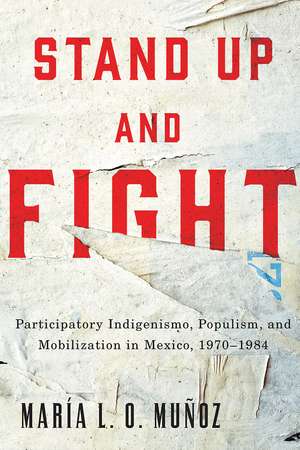Stand Up and Fight: Participatory Indigenismo, Populism, and Mobilization in Mexico, 1970–1984
Autor María L. O. Muñozen Limba Engleză Hardback – 12 mai 2016
In 1975 a watershed moment captivated Mexico as indigenous peoples from across the country came together on the Island of Janitzio for the First National Congress of Indigenous Peoples. The congress was a federal government initiative intended to preempt an independent indigenous movement. But indigenous groups circumvented the intended containment policies of the congress and made bold demands for political self-determination.
Using previously unavailable documents, María L. O. Muñoz examines the events that led to the congress, the meeting itself, and developments after the assembly. Muñoz shows how indigenous leaders working within Mexico’s Department of Colonization and Agrarian Affairs (DAAC) sidestepped state attempts to control indigenous communities, and how they made bold demands that redefined the ways federal and state governments engaged with pueblos indígenas.
Through research in previously untapped archives, Muñoz is able to trace the political history of the indigenous leaders and government officials who redefined the ways indigenous peoples engaged with governments. She illustrates the fluid and evolving power relationships of the key players with a focus on the twelve years of populism in the last decades of the twentieth century.
This book challenges the discourse of unquestioned power and hegemony of the national ruling party, the Institutional Revolutionary Party (PRI), and it illustrates how indigenous communities in Mexico reimagined their roles in the social, political, and economic life of the nation.
Using previously unavailable documents, María L. O. Muñoz examines the events that led to the congress, the meeting itself, and developments after the assembly. Muñoz shows how indigenous leaders working within Mexico’s Department of Colonization and Agrarian Affairs (DAAC) sidestepped state attempts to control indigenous communities, and how they made bold demands that redefined the ways federal and state governments engaged with pueblos indígenas.
Through research in previously untapped archives, Muñoz is able to trace the political history of the indigenous leaders and government officials who redefined the ways indigenous peoples engaged with governments. She illustrates the fluid and evolving power relationships of the key players with a focus on the twelve years of populism in the last decades of the twentieth century.
This book challenges the discourse of unquestioned power and hegemony of the national ruling party, the Institutional Revolutionary Party (PRI), and it illustrates how indigenous communities in Mexico reimagined their roles in the social, political, and economic life of the nation.
Preț: 379.28 lei
Preț vechi: 510.88 lei
-26% Nou
Puncte Express: 569
Preț estimativ în valută:
72.58€ • 75.32$ • 60.67£
72.58€ • 75.32$ • 60.67£
Carte indisponibilă temporar
Doresc să fiu notificat când acest titlu va fi disponibil:
Se trimite...
Preluare comenzi: 021 569.72.76
Specificații
ISBN-13: 9780816532506
ISBN-10: 0816532508
Pagini: 280
Ilustrații: 6 halftones, 2 maps, 3 tables
Dimensiuni: 152 x 229 x 23 mm
Greutate: 0.51 kg
Ediția:1
Editura: University of Arizona Press
Colecția University of Arizona Press
ISBN-10: 0816532508
Pagini: 280
Ilustrații: 6 halftones, 2 maps, 3 tables
Dimensiuni: 152 x 229 x 23 mm
Greutate: 0.51 kg
Ediția:1
Editura: University of Arizona Press
Colecția University of Arizona Press
Notă biografică
María L. O. Muñoz is an associate professor of history at Susquehanna University, where she serves as an associate director of the honors program. She is the co-editor of Populism in Twentieth Century Mexico: The Presidencies of Lázaro Cárdenas and Luis Echeverría.
Cuprins
List of Illustrations
Acknowledgments
List of Abbreviations
Introduction: The Field of Force
1 Entre Pueblo y Gobierno: Luis Echeverría and the Rhetoric of Populism
2 The Path to Participatory Indigenismo
3 Brokering for Inclusion: The Rise of DAA C Indigenous Bilingual Promoters, 1970–1975
4 Campesino versus Indígena: Regional Indigenous Congresses and the Struggle for the Countryside
5 Negotiating Participatory Indigenismo: The First National Congress of Indigenous Peoples
6 In Defense of Our People: The National Council of Indigenous Peoples, 1975–1985
Conclusion: Reimagining the Field of Force
Notes
Bibliography
Index
Acknowledgments
List of Abbreviations
Introduction: The Field of Force
1 Entre Pueblo y Gobierno: Luis Echeverría and the Rhetoric of Populism
2 The Path to Participatory Indigenismo
3 Brokering for Inclusion: The Rise of DAA C Indigenous Bilingual Promoters, 1970–1975
4 Campesino versus Indígena: Regional Indigenous Congresses and the Struggle for the Countryside
5 Negotiating Participatory Indigenismo: The First National Congress of Indigenous Peoples
6 In Defense of Our People: The National Council of Indigenous Peoples, 1975–1985
Conclusion: Reimagining the Field of Force
Notes
Bibliography
Index
Recenzii
“An original and field-changing book.”—NAIS
“Muñoz provides a penetrating analysis of Mexican indigenous mobilization in the late twentieth century. Any scholar interested in postwar Mexico, indigenous movements, and state formation should read this important book.”—American Historical Review
“Muñoz provides a penetrating analysis of Mexican indigenous mobilization in the late twentieth century. Any scholar interested in postwar Mexico, indigenous movements, and state formation should read this important book.”—American Historical Review
Descriere
Stand Up and Fight is the opening analysis of the First National Congress of Indigenous Peoples in Mexico. The author uses never-before-available documents to trace the political history of a group of indigenous leaders and government representatives who defined politics in their own terms during the 1970s and early 1980s.
